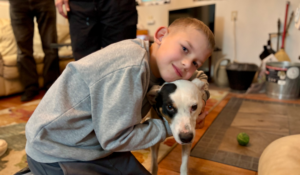CHAMPAIGN – On a chilly winter evening in Champaign, the smell of pasta sauce and freshly baked cookies filled the kitchen of the Gioja family home — a place that has become familiar to Yevhenii and Tetiana Ivashkevych.
The couple, who go by Gene and Tanya, and their two sons, Matvii, 16, and Hordii, 7, fled the city of Bila Tserkva in Ukraine last fall due to the ongoing war with Russia.
They received approval to come to the U.S. through the Uniting for Ukraine program, or U4U, which was created shortly after the war began in early 2022 to provide a pathway for Ukrainian citizens to come to the U.S. for two years on humanitarian parole.
Up until recently, the Ivashkevych family had been staying with the Giojas, who are their U.S. sponsors. In January, they moved into their own apartment in Mahomet. During this recent visit, Tanya shared how overwhelmed she was with the support they received from new friends at church with the move.
“It’s this small tiny apartment but here we have 20 people helping out,” Tanya said.
The Ivashkevych family is among the more than 6 million refugees from Ukraine who have been recorded globally — a quarter million of whom have come to the United States since Russia launched a military invasion of Ukraine three years ago, on Feb. 24, 2022.
But the refugee resettlement program that allows them to be here was paused by President Trump’s administration just days after he took office in January.
Now, Gene and Tanya, and their boys, are faced with uncertainty about their future.
“There are other options for reparole,” Tanya said, referring to the process of applying to stay longer in the U.S. once their time under U4U is up. “We will look for them and we will try.”
Fleeing a war zone
Tanya Ivashkevych recalls how it all started three years ago.
“It was February 24 and at 4:45 a.m. we heard… rocket attacks to our city,” she said. “I woke up, and Gene, he said to me, ‘The war started.’”
That day, Russia launched a full-scale invasion of Ukraine and attacked from the north, east and south. Russian President Vladimir Putin called the invasion a “special military operation” for the “demilitarization” and “denazification” of the country.
As of August 2024, the United Nations verified that roughly 12,000 civilians have died and more than 24,000 have been injured in Ukraine since the initial attacks.
To move to safety and be with their loved ones, the Ivashkevych family packed their clothes and important belongings to go to Gene’s father’s house located near the center of the city, near a military base.
“We saw the military base from our windows. It was terrible,” Tanya said.
On April 21, 2022, almost two months after the invasion, the U.S. announced the Uniting for Ukraine program.
When Gene and Tanya first heard about the program, they were hesitant to apply because they knew it would be hard to leave together under Ukraine’s martial law, which does not allow able-bodied men between the ages of 18 and 60 to leave the country.
“[Gene] told me about this program, but I said no,” Tanya said.
But then in May 2023, Gene Ivashkevych underwent open heart surgery. Because of his health issues, he was no longer required by martial law to stay in Ukraine by law. So a year after his recovery, the family started the process of coming to the United States.
In order to qualify for the U4U program, they needed to find a sponsor in the U.S. who would agree to be financially responsible for them during their stay.
The family completed a profile on Welcome.US, an online portal that connects willing sponsors with refugees.
A warm welcome to Champaign
As the Ivashkevych family waited to see if they’d match with a sponsor, more than 5,000 miles away the Gioja family in Champaign had submitted their sponsorship application to the same portal.
Les and Penny Gioja are Champaign residents and owners of the Joy of Illinois Farm.
Since their nine children have grown up and moved away, the couple has opened their home to those in need of housing and assistance for years.
“We’ve helped a number of international students over the years with housing and all kinds of things. We also hosted a Russian refugee family … [and] a refugee family from Bulgaria,” Les Gioja said. “So, all together, I think it’s seven family units that we’ve helped.”

The Giojas completed their application right before bed on April 2 last year, and when they woke up, five Ukrainian families had contacted them.
Penny Gioja said she spent time talking to the different families to determine whether they would be a good match for their home and lifestyle.
As they got to know the Ivashkevych family, Penny said they offered to be their sponsors in May. Gene and Tanya accepted.
Penny spent the next few months filling out paperwork with various agencies, including the U.S. Citizenship and Immigration Services. In June, their cases were approved and the family received travel authorizations from U.S. Customs and Border Patrol shortly after.
But the family could not leave the country without receiving physical documents approving Gene’s exemption from military service. After several weeks, it arrived and the family booked their flights.
The Ivashkevych family landed in Chicago on September 22. The Giojas picked them up from O’Hare International Airport, and they began the process of settling in.
“On September 25, we had an appointment for schools, for physical exams for us and for [the] children — everything, Penny prepared everything,” Tanya said.
There was a lot for the family to navigate: signing up for Medicaid health insurance, and applying for driver’s licenses, work authorization and food assistance, which refugees qualify for through the federal SNAP program.
The two boys, Matvii and Hordii, started attending school soon after.
Tanya said her youngest is particularly excited to continue his education. He had just become old enough to enroll in school in Ukraine last September, before leaving for the U.S.
“It was two weeks, but some days he was at home because of the alarms and also in the shelters at school,” she said.
As the family settled in, they found a church in Mahomet and made friends with other Ukrainians in the area – some of whom helped Gene find a job at a plastic fabrication company. At the same time, Tanya started looking into programs and classes to enroll in herself.
After three months of living with the Gioja family, Gene and Tanya felt ready to try living on their own.
In January, the day after President Trump took office, they moved to an apartment in Mahomet.
An uncertain future
A few days later, the Trump administration announced that the Uniting for Ukraine program was paused and would not accept any new applicants. According to Welcome.US, immigration officials may also start reviewing the cases of people – like Gene and Tanya – who are in the U.S. on humanitarian parole.
It’s unclear if the program will be unpaused — or terminated completely. That’s something Les Gioja thinks would be unfair to people who are fleeing incredibly difficult circumstances.
“There are a number of people whose attitudes are such, that especially with Haitians, they [immigrants and refugees] are evil, they all should go home. Every one of the parolees we’ve helped, they have a job… they’re contributing to society,” Gioja said. “It doesn’t make sense to send them home.”
Centers that help with refugee resettlement are also concerned about the future of their services and operations.
The East Central Illinois Refugee Mutual Assistance Center in Champaign is not getting reimbursed for services it’s currently providing to refugees in the area, said Lisa Wilson, executive director of the local nonprofit.
“Before a refugee arrives, we have to find a place for them to live and execute a lease,” Wilson said. “So that is money that comes out of the Refugee Center and then is put back in by the U.S. Conference of Catholic Bishops,” or USCCB, the Refugee Center’s parent organization.
But the USCCB has not received from the federal government, which means they cannot reimburse the center.
The center may have to cut its services soon unless something changes, she said.
On February 18, USCCB filed a lawsuit against the Trump administration alleging the funding was illegally suspended.
“We are urging the government to uphold its legal and moral obligations to refugees and to restore the necessary funding to ensure that faith-based and community organizations can continue this vital work that reflects our nation’s values of compassion, justice, and hospitality,” said spokesperson Chieko Noguchi, in a statement.
For now, Wilson is holding onto hope that “our courts will uphold this legal system of immigration and certainly pay us the money that we are owed for doing this kind of resettlement work.”
Moving forward despite the uncertainties
Despite the uncertainties of the future, the Ivashkevich family continues to take steps to settle into their new life in the U.S.
Tanya has started classes at Parkland College in nursing and she hopes to fulfill her dream of working in medicine.
Her eldest son, Matvii, said he really likes his new school in Mahomet and is thinking he might want to try out for the basketball team. Tanya said Hordii, age 7, has also adjusted well to school — and is hoping to follow his big brother’s footsteps and also play basketball.

Tanya said they fear for their families back home, especially when they hear news of the ongoing war. And they worry about whether they’ll be able to reapply for permission to stay in the U.S. once their two years of humanitarian parole are up.
But for now, she says they’re focused on rebuilding their lives — and grateful for the friends they’ve met and the generous support they’ve received along the way.
“I’m happy because we have Penny and Les. They’re kind. They’re great, great people. My favorite part is meeting with our new friends, “ she said. “I like people here. The people are so kind.”

